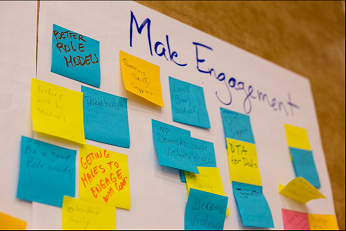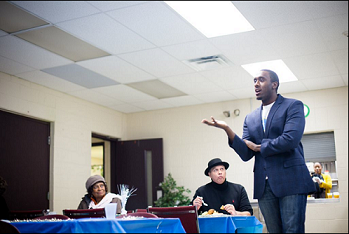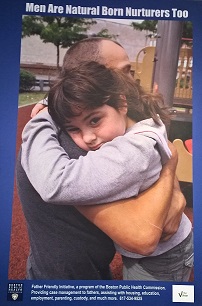Network Driven Collaboration: Male Engagement
Before I became an AmeriCorps VISTA, male engagement and fatherhood initiatives were not even a blip on my radar. The depiction of black fatherhood in society today is often negative and as a result, a very large shadow is cast on the male caregivers that are positively involved in their children’s lives. Not all fathers follow the storyline that leads to their incarceration or parental absence. Through the Leadership Summit, I was able to meet individuals working in Boston to support these present and committed fathers.
When it comes to the climate of fatherhood and male engagement work in Boston, there are organizations that have succeeded in delivering services to promote self-care and development, building relationships, and navigating social support institutions.

As a Network, Vital Village used the Leadership Summit as an opportunity to increase collaboration among those engaged in male engagement work in Boston and utilize action-based strategic planning to support interwoven efforts. Many Leadership Summit participants were involved in similar work with common goals, yet employed different approaches. It was therefore important for us as a network and as a community to develop and agree upon common strategies. The tools developed by the Interaction Institute for Social Change and the Institute of Health Care Improvement were helpful for facilitating discussions to support alignment and collaboration. In the time following the Summit, we have facilitated meaningful partnerships across these organizations and community residents that resulted in: 1) the writing and submission of 4 collaborative grants; 2) several male engagement or fatherhood task force groups; 3) cross-collaboration in the organizing and hosting of events; and 4) centralized planning for a series of co-led programs to support male engagement over the next year.
Since the Leadership Summit, I have had the pleasure and privilege of working with Charles Daniels, the founder and CEO of Father’s Uplift. Father’s Uplift aims to help fathers and men achieve their maximum potential to leave a positive impact on the development and health of their children. In a conversation I had with Charles, he said:

“Before making assumptions about absent fathers and completely casting them all into one category, the following questions should be asked: what is the story behind their situation? Is there a reason behind their experience? How do they as a male in our society view themselves? These questions will enable one to better understand the father as a person rather than as a problem.”
Charles’s approach to addressing the needs fathers and families starts with a simple yet challenging question: How do we reduce the barriers that men need to hurdle in order to be present in their children’s lives and active members in society?
Charles aimed to address the following question: How do we fill the need for safe and supportive housing for single fathers in transition? And thus, his 90-Day Challenge was born: to create a strategic plan for developing a safe, accessible Family Shelter in which fathers and families will be able to spend time with their children in their transition. During the 90-Day Challenge, Charles participated in our teleconferences and our online portal, Big Tent, which served as a meeting site for brainstorming and troubleshooting. Through the teleconferences and online conversations, the Network was able to help Charles consider the following:
- How to identify funding streams and ways to make the shelter sustainable
- How to identify information on the processes and policies needed to obtain vacant properties and support from the city
- How to document the process and collect testimony around the need for a shelter
 Charles took several action steps toward achieving his goal, which began with researching potential buildings that met his criteria. We used an asset mapping activity to pinpoint pivotal community members, social institutions, and individuals in leadership positions. From this activity, he was able to identify key stakeholders and local politicians and drafted a concept paper and letter to garner support for this work.
Charles took several action steps toward achieving his goal, which began with researching potential buildings that met his criteria. We used an asset mapping activity to pinpoint pivotal community members, social institutions, and individuals in leadership positions. From this activity, he was able to identify key stakeholders and local politicians and drafted a concept paper and letter to garner support for this work.
Through this work, I have become familiarized with the male engagement work and fatherhood initiatives around Boston and had the privilege of working with many of the committed individuals and teams supporting these efforts.
I have also had the opportunity to meet some of the men who have graduated from these programs and see how they are engaged in community service and improving the lives of other fathers. I met Mr. Charles Purnell when he was volunteering at a male engagement breakfast for Father’s Uplift. A soft spoken, hard-working man, Mr. Purnell is a grandfather and graduate of the program. Charles Daniels referred Mr. Purnell to a digital story telling workshop in which he was able to narrate and commemorate his own journey to become an active father and grandfather. Using this digital story, Mr. Purnell is now sharing his inspirational narrative around the city to encourage other fathers.
The next step for our Network is to continue the Male Engagement Strategic Planning meetings. During these meetings, we are developing a Male and Child Health Development series tailored to assist fathers in actively reengaging in their children’s lives. We are in the process of collaborating with a financial institution to improve the fathers’ financial literacy skills and provide funding for the Ebenezer Baptist Church’s Celebration for Fathers. Additionally, we are working with the Family Nurturing Center on their Male Engagement Dialogue Series that focuses on Healthy Development of Children & Navigating Systems Barriers.
The Male Engagement Strategic Planning meeting space is driven by partner participation that is populated by different professions and backgrounds. These collaborative activities underscore the need to include all perspectives in order to address the barriers and challenges faced by fathers and men in our community.
Last year Rich DeRosa, the Director of the Father Friendly Initiative (FFI) at Boston Public Health Commission, worked with partners to launch the Nurturing Fathers Campaign.

This campaign utilized media to share the message that “Men are natural born nurturers too”. Following the Leadership Summit, Rich helped mobilize network wide support for fatherhood and male engagement through a One Day Challenge (learn more here) calling for collaboration across sectors.
In addition to the fatherhood groups FFI is developing a survey to engage men so that their input is included in the programming for the year. This capacity building is also evident in the work that Children’s Trust is doing in relation to a collaborative Mentorship Program. This program would centralize engagement activities across the network to facilitate knowledge sharing and cohesion for fathers post-graduation by allowing them to become mentors and facilitate their own groups.

